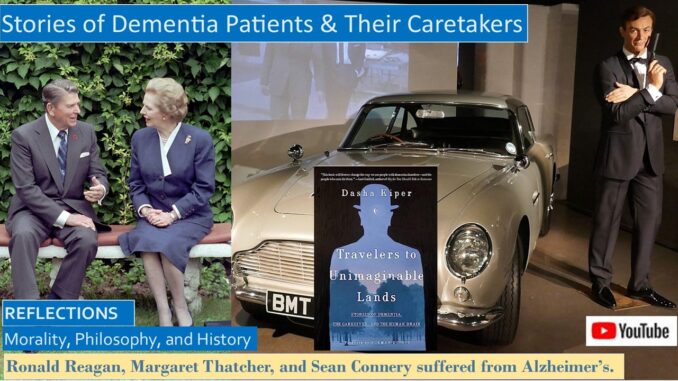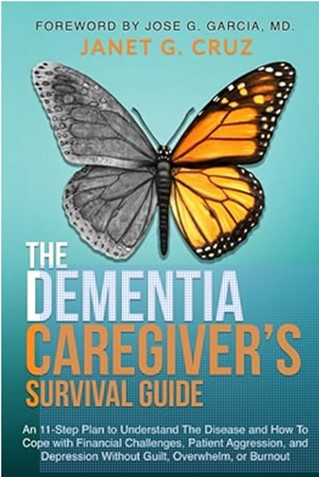
What can we learn when we reflect on these case studies of people who suffer from dementia and their family caretakers?
Is dementia a disease that you catch, that one day may be magically cured, or is dementia a condition that is an extreme case of the cognitive decline we all experience as we approach our sixties and seventies?
Why are the dysfunctions of relationships between the dementia patient and their family caretakers enhanced and aggravated by the cognitive decline accompanying dementia?
Why do caretakers so often tussle with their loved ones who suffer from dementia, when they know that their dementia has robbed them of their short-term memory?
YouTube Script with Book Links:
https://www.slideshare.net/BruceStrom1/problems-family-caretakers-face-when-caring-for-loved-ones-suffering-from-dementia
YouTube video for this blog: https://youtu.be/VqR7y0Z8bYk
THE SLOW TRANSITION FROM NORMAL BEHAVIOR TO DEMENTIA
Why is the book, Travelers To Unimaginable Lands, needed? Norman Doidge, who wrote the forward, explains, “none of the mainstream drugs for dementia disorders does much to reverse cognitive decline, except to offer a few months of lessening symptoms.” There will be no magical cures. His argument is that the idea that Alzheimer’s is caused by excessive amyloid plaques in the brain “is woefully inadequate to explain the disease,” it is more complicated than that. Although dementia cases caused by drugs, dehydration, or a vitamin deficiency are sometimes reversible, those dementia cases caused by cognitive decline are irreversible. Usually, treatments for neurological conditions can only delay the decline, they cannot reverse the decline.
For many of our videos on dementia we feature celebrities who suffered from this condition. Margaret Thatcher and Sean Connery were diagnosed a few years before their departure, Thatcher died at eighty-seven, and Sean Connery died at ninety. Ronald Reagan had a long and productive life, he was seventy when his two terms in office began. Early in his Presidency he survived an assassination attempt where he was shot in the lungs and nearly died, whether this was one trigger for his eventual Alzheimer’s is anyone’s guess. Five years after his Presidency he was diagnosed with Alzheimer’s, he passed away ten years later.
Many of his political opponents speculate whether Reagan displayed signs during his last years as President, all attending physicians affirmatively deny this. But one theme of the book we will be reviewing today paints a different picture, a picture where dementia does not one day just happen to the patient, but where rather someone’s demented behavior slowly evolves and transitions from their normal behavior. So, it is really pointless even to speculate on such questions, no good can come from it.
To clarify, there are many types of dementia, but Alzheimer’s patients comprise over seventy percent of dementia cases. Also, dementia first robs the patient of their ability to remember recent events, even from five minutes ago, but long-term memories are more durable. Also, dementia robs the patient of their moral compass, since they are not as able to regulate how their emotions influenced their behavior. About seven percent of the elderly over sixty will suffer from dementia in their lifetimes.
This book compares the dance between the dementia patient and the loved ones who are their caretakers where they seem to have the same arguments over and over again, the “Alzheimer’s patients seem unable to learn from their mistakes. But it is also, because, weirdly enough, caregivers experience the same problem. In an uncanny mirroring, we get pulled into a parallel process with our charges, forgetting what happened yesterday, repeating what didn’t work last time, becoming ever more prone to agitation and impatience, even as we’re engaged in a trial of devotion that pushes love to its limit.” [1]
We saw this dance in Kim Campbell’s excellent biography of the last years of Glen Campbell, her husband, who suffered from Alzheimer’s. Whenever the brain suffers from any type of loss, it has amazing powers of self-healing and rewiring to bypass the problem. The old personality does not disappear, any dysfunctions in the relationship simply morph into baffling new behaviors. The patient, until the very end, does not lose the ability to push your buttons.
This is a touching story, the last album Glen Campbell recorded included lyrics that explored how frustrating it was to live with Alzheimer’s. They asked the doctor: Should he embark on a last farewell tour? The doctor encouraged him to tour as long as he was able, keeping him active would slow down the progress of his dementia, and music often calms the patient. They asked Glen what would happen if he said or did something embarrassing: How to respond? Glen simply said: “Tell everyone I have Alzheimer’s,” then they will understand.
Glen Campbell Suffering from Alzheimer’s, Early Signs and Symptoms
https://seekingvirtueandwisdom.com/glen-campbell-suffering-from-alzheimers-early-signs-and-symptoms/
https://youtu.be/F9NmDiiPowI
Like Glen Campbell, Tony Bennett insisted on touring as long as he could, also cutting a farewell duet album with his good friend, Lady Gaga. Rita Hayworth was the first celebrity to admit to an Alzheimer’s diagnosis, her daughter is a board member and fundraiser for the Alzheimer’s Association.
Tony Bennett and Rita Hayworth: Their Struggle With Alzheimer’s
https://seekingvirtueandwisdom.com/tony-bennett-and-rita-hayworth-their-struggle-with-alzheimers/
https://youtu.be/4ujlV3a7Il8
How did I first become aware of dementia? When I intervened to stop the foreclosure of a destitute owner so he could be appointed a guardian by the court. The guardian placed him in a compassionate lock-down facility for Alzheimer’s patients, and then sold his unit and paid his debts. Many in the community were fed up with his demented behavior, his only family was an estranged sister. That is all I know, perhaps they were estranged for decades, but I just cannot help but wonder: Did his demented behavior also drive her away?
How I Halted a Foreclosure on a Destitute Owner with Advanced Dementia! We Discuss Dementia
https://seekingvirtueandwisdom.com/how-i-halted-foreclosure-on-owner-with-advanced-dementia-reflecting-on-dementia/
https://youtu.be/_uAJPCCRNQ8
TRAVELERS TO UNIMAGINABLE LANDS
When we think of dementia as a disease, we picture it as something that the elderly person catches that makes them different than they were before. When you view dementia in this manner, you tend to assume that their puzzling behavior is totally new behavior.
But the overriding theme of this book is that this behavior is not totally new behavior, the baffling behavior is their old irritating behaviors that carry forward and evolve into more extreme forms as the condition progresses. All of us have irritating quirks that irritate those around us. Whatever dysfunctions exist in the relationship between patient and caretaker, especially when the caretaker is a loved one, become more pronounced and intractable as the condition progresses.
We all suffer cognitive decline, many become more forgetful as they get older.[2] For those of us who have always been forgetful, this transition may be less noticeable. Psychologists have proven that everyone’s response time, or the time taken to solve puzzles, also known as executive functioning, slows considerable in our retirement in our sixties and seventies.[3]
What is often new behavior is the anger that many dementia patients feel that often causes them to lash out at their caretakers and those around them. These angry emotions are caused by the frustrations of the disease or may be caused by the patient not being able to take care of themselves: maybe they haven’t eaten, maybe they are not feeling well, maybe they have a urinary tract infection from not drinking enough, and often they have not been to the doctor lately.
The author, Dasha Piper, notes that the narratives between the patient and the caregiver caused by these dysfunctions “can be surprisingly resilient even in the face of neurological damage. The ‘personality knowledge’ that forms our self-image is not easily damaged by dementia. What is affected, however, is the ability to update this self-image.”[4]
This means that the dementia patient remembers himself as he used to be, but he does not remember how he was yesterday or this morning. Often, he loses both his short-term memory and his moral compass, guided only by his raw emotions. When his caretaker is a loved one, they remember the patient as they were before, and often become angry at their behavior, forgetting that they are at the mercy of their dementia, that they little control over their behavior, as their emotions now govern their behavior directly. Then the caretakers feel guilty about their anger.
Sometimes caregivers blame themselves for not spotting dementia earlier. But, as the author notes, “although clear-cut signs of Alzheimer’s: incoherence, sexual inappropriateness, getting lost in familiar places, paranoid delusions, even physical violence, are often present, family members still hesitate to make the leap to a neurological diagnosis.”[5]
DEMENTIA PATIENTS AND THEIR FAMILY CAREGIVERS
These patterns are seen in the first chapter, where Mr Kessler, the patient, was a survivor of the Nazi concentration camps. This patient the author had helped care for earlier. This traumatic experience made him obstinate, and overinvested in and over-critical of his musician son Sam.
Our author says that “Mr Kessler didn’t mind Sam ‘making noise’ in the house, but playing music was no way of making a living. Sam needed to get a job first and play music second.” As Mr Kessler’s dementia advanced, their roles reversed, and Sam became more demanding, becoming angry in response to his father’s needling.[6]
The second chapter described Mila, a patient who lived in poverty in Soviet Russia before moving to America. Mila was obsessed with her possessions, even before her dementia she would barge into her daughter Lara’s room demanding that she help her look for her stockings or towels.
The author stated that “Mila turned her daughter into a secure base that she had been deprived of. For Mila, the world was a chaotic, scary place, and Lara was her lifeline.” As Mila developed dementia, her insecurities worsened, and her behavior became more erratic.[7]
In the fourth chapter, we meet Elizabeth and her husband Mitch. When they were dating, after work they would meet often in a Greenwich Village restaurant for dinner and a cocktail. They were married, and after many happy years Mitch developed symptoms of Alzheimer’s. He would then leave their apartment for the Greenwich restaurant, and Elizabeth would follow and meet him there as they did so many years before, like they were dating, and when dinner was over, she would rush ahead so she could meet him when he arrived home. But often when he arrived home, he would not know who she was! One time he even called the police to report the supposed intruder.[8]
CATHY AND FRANK, EVERY DAY IS SUNDAY
In the sixth chapter we meet Cathy and Frank, who, after dementia overtook him, thought every day was Sunday. Before he was skeptical, but “as his memory began to fail, the prudish, rule-bound side of him emerged. Dementia, Cathy said wryly, had brought out his ‘inner Catholic boy.’”
“Frank began to fixate on ritual, insisting they attend church every Sunday. This would have been fine, but for Frank, every day was Sunday.” Sometimes she tried to reason with him, she had the priest try to reason with him, but how can you reason with someone with dementia?
Our author notes that sometimes dementia patients “compensate for their illness and vulnerabilities with a kind of extreme piety that makes it hard to see the condition.” This aggravated Cathy, who thought this was his way of showing off, that this was just for show.
Unfortunately, “as the disease progressed, Frank gradually stopped seeing Cathy as a complete person. She became a prop, a vessel into which he poured his fixations. So, while Frank was able to sublimate his internal chaos by turning to ritual, Cathy had no one and nothing to turn to. Instead, she found herself living with a humorless stranger.”
Frank also constantly watched ball games and movies on the television. He would get absorbed, he would yell at the ballplayers, he would yell at the characters in the movies, he would shake his fist at the television. This drove Cathy crazy, once she went into the bathroom to escape. She even thought about leaving him for a fleeting moment; but snapped out of it and returned to the blaring TV living room.
She confided to our author, “Know what made it even worse?” she asked. “As soon as he saw me, his face broke into a huge smile. God, he’s always so happy when he sees me, telling me how much he loves me even though he barely knows who I am anymore. But I can’t bring myself to say it back. What’s wrong with me? Shouldn’t I want to be with him, take care of him?”
Frank got worse. He became convinced that thieves were stalking the house, so he locked all the doors and closed all the windows. Cathy lived with this loneliness, caring for Frank for six long years.
Cathy blamed herself for trying to correct Frank, telling him that today is not Sunday, telling him that Doris Day is not taking anything off, that Clint Eastwood really didn’t shoot anybody, in real life.
The author reassured her, her feelings were not her fault. It can be tough caring for someone with dementia. The author notes, “Humans are ultra-social and require others to see the world as they do. This need for a shared reality not only creates a connection to others but also validates feelings, judgments, and sense of self. Without such validation, we become both physically agitated and cognitively uncertain about what we know and how we are. Moreover, this need for a mutually agreed-upon reality is so strong that we naturally overestimate the degree to which others, especially loved ones, share our thoughts and perceptions.”
“So, when a spouse or a parent suddenly sees the world very differently from us, we might intellectually register this as a symptom but unconsciously feel that an implicit social promise has been broken.” We find it difficult to truly believe that loved ones suffering from dementia have lost their free will along with their memory, they are hostages to their emotions.[9]
HENRY AND IDA, WHO TALKS TO PHOTOGRAPHS AND BOOKS
In the seventh chapter we meet Henry and Ida, they loved music, they loved novels, Henry was an architect. When she was in her mid-seventies, Ida succumbed to Alzheimer’s. Ida started talking to the many photographs of family and acquaintances hanging in the hall of their apartment. Then she started talking to the books they owned.
The author remembers, “as Henry ruefully observed to me during one of our last meetings, ‘I suppose I should be happy that she’s happy. She has her books and her pictures, and when I play music for her, she’s in heaven. She doesn’t really need anything else.’”
“He then fell silent for a moment. ‘But how do I get used to the fact that she has no use for me?’”[10]
CONCLUSION
Our author concludes: “Indeed, the more I listened to caregivers and the more I read about the brain, the more it occurred to me that the ‘healthy’ brain’s ingrained biases and proclivities make it unequipped in many ways to deal with the cognitively impaired brain. Because of such neurological constraints, I wanted caregivers to understand that it was not character flaws that made caregiving so fraught, but rather their own brain’s intrinsic workings. And naturally I hoped they would accord themselves the same forgiveness that they’re encouraged to offer their patients.”[11]
My condominium association now actively seeks to assist those dementia patients in our community. But their initial opposition illustrates how difficult it is for people to accept that those who suffer from dementia are really not responsible for their actions, nor are they responsible for their neglect in handling their financial affairs.
How I Halted a Foreclosure on a Destitute Owner with Advanced Dementia! We Discuss Dementia
https://seekingvirtueandwisdom.com/how-i-halted-foreclosure-on-owner-with-advanced-dementia-reflecting-on-dementia/
https://youtu.be/_uAJPCCRNQ8
DISCUSSING THE SOURCES
We discussed several, but not all, case studies from the medical practice of Dr Dasha Piper from this excellent book, Travelers to Unimaginable Lands. This is one of those rare books that is accessible to the layman and useful to the clinician. Scan the footnotes, he has excellent references to many additional sources and observations, these apply both to dementia in particular, and to how our brain functions in general. Many tendencies in a normally functioning brain are greatly exaggerated in the compromised dementia brain.
FOOTNOTES FOR PAGES IN BOOK:
Page xxi footnote refers to The Man Who Mistook His Wife for a Hat and Other Clinical Tales by Oliver Sacks. Some of these cases are related to dementia, plus other puzzling neurological disorders and their baffling manifestations. These cases cannot be cured, the family and physician must learn to manage them as best they can.
Page 127 footnote: Our author is referring to the book Learning to Speak Alzheimer’s. We plan to do a video on these two books in the near future.
Page 149 footnote refers to Lawrence Kohlberg’s book, State and Sequence: The Cognitive-Developmental Approach to Socialization. This book “was heavily influenced by the work of Jean Piaget,” “a prominent developmental psychologist” specializing in the psychology of children.
Page 174 footnote: “Nietzsche touches on how the popular mind is primed to impose intentions even on mindless phenomena and how language reinforces this tendency” in his Genealogy of Morals and Ecce Homo. You should read and study Nietzsche with caution and skepticism.
Page xxii footnote: One type of cognitive reserve is the brain reserve model, where “some people have a larger brain with more neurons and synapses, which allows the brain to withstand pathology better,” including dementia.
Page 32-33 footnote: “We tend to feel and overestimate conscious will when we act and make decisions.” This makes sense because “our lack of awareness is a defining feature of our unconscious.”
Page 38 footnote: “Our brain has been characterized as lazy,” “or fast and frugal,” “favoring habit over difficult change.”
Page 45 footnote: “We have a tendency to believe that our perceptions of the world reflect how it actually looks. As a result, we overestimate our accuracy and objectivity. This bias, called naïve realism, holds true for our visual perceptions as well as our day-to-day world views.” This is especially true for those who value research into conspiracy theories on the internet over credible sources.
Page 80-81 footnote: “Benjamin Libet measured consciousness’ role in behavior.” In this much debated study, “Libet did not believe his study showed there is no free will.”
Page 92 footnote: “Humans tend to use their knowledge, beliefs, and expertise as a proxy for what others feel and behave,” which is a side effect of “our natural egocentricity in our perspectives. One example is the false consensus effect,” “which leads us to think that others share our point of view more than they actually do.”
“The curse of knowledge leads us to overestimate the degree to which people know about something we have learned or are experts in.” This is a tendency that teachers and journalists fight constantly.
“The illusion of transparency leads us to overestimate how much people share in knowing about how we are feeling.” In other words, ladies, us men cannot read your minds.
Page 97 footnote: When “dealing with someone’s delusions,” we sometimes lose patience and cannot resist the urge to correct a delusion when we are tired and in a state of “ego depletion.” “We need self-control when accepting or adjusting to another person’s reality because it means overcoming our inherent egocentric perspective.”
Page 108 footnote: “Some argue that the reason our brains grew is from the pressures of managing increasingly complex social structures. Our large brains help us navigate the social world.” It really is challenging to read people’s minds.
Page 130 footnote: Our brains are “wired to believe or accept things as fact” even when they are nonsense that “our mind tries to make sense of.”
Page 137 footnote: “Putting yourself in other people’s shoes often decreases the accuracy” of your perceptions. Rather than trying to imagine what is going on in the head of those with dementia, you “should simply ask them directly about their state of mind.” However, this is impractical when they are in an advanced state of dementia.[12]
We must also mention the excellent website for the Alzheimer’s Association, which we quote from in many of our other videos on dementia.
[1] Dasha Kiper, Travelers to Unimaginable Lands, Forward by Norman Doidge (New York, Random House, 2023), pp. ix-xxvii, 6-7 and https://en.wikipedia.org/wiki/Margaret_Thatcher and https://en.wikipedia.org/wiki/Sean_Connery and https://en.wikipedia.org/wiki/Ronald_Reagan
[2] https://www.webmd.com/healthy-aging/what-to-know-about-cognitive-decline-in-older-adults
[3] https://en.wikipedia.org/wiki/Executive_functions
[4] Dasha Kiper, Travelers to Unimaginable Lands, p. 11.
[5] Dasha Kiper, Travelers to Unimaginable Lands, p. 43.
[6] Dasha Kiper, Travelers to Unimaginable Lands, pp. 3-21.
[7] Dasha Kiper, Travelers to Unimaginable Lands, pp. 23-39.
[8] Dasha Kiper, Travelers to Unimaginable Lands, pp. 56-72.
[9] Dasha Kiper, Travelers to Unimaginable Lands, pp. 89-100.
[10] Dasha Kiper, Travelers to Unimaginable Lands, pp. 102-112.
[11] Dasha Kiper, Travelers to Unimaginable Lands, p. 183.
[12] Dasha Kiper, Travelers to Unimaginable Lands, footnotes, pp. 191-221











3 Trackbacks / Pingbacks